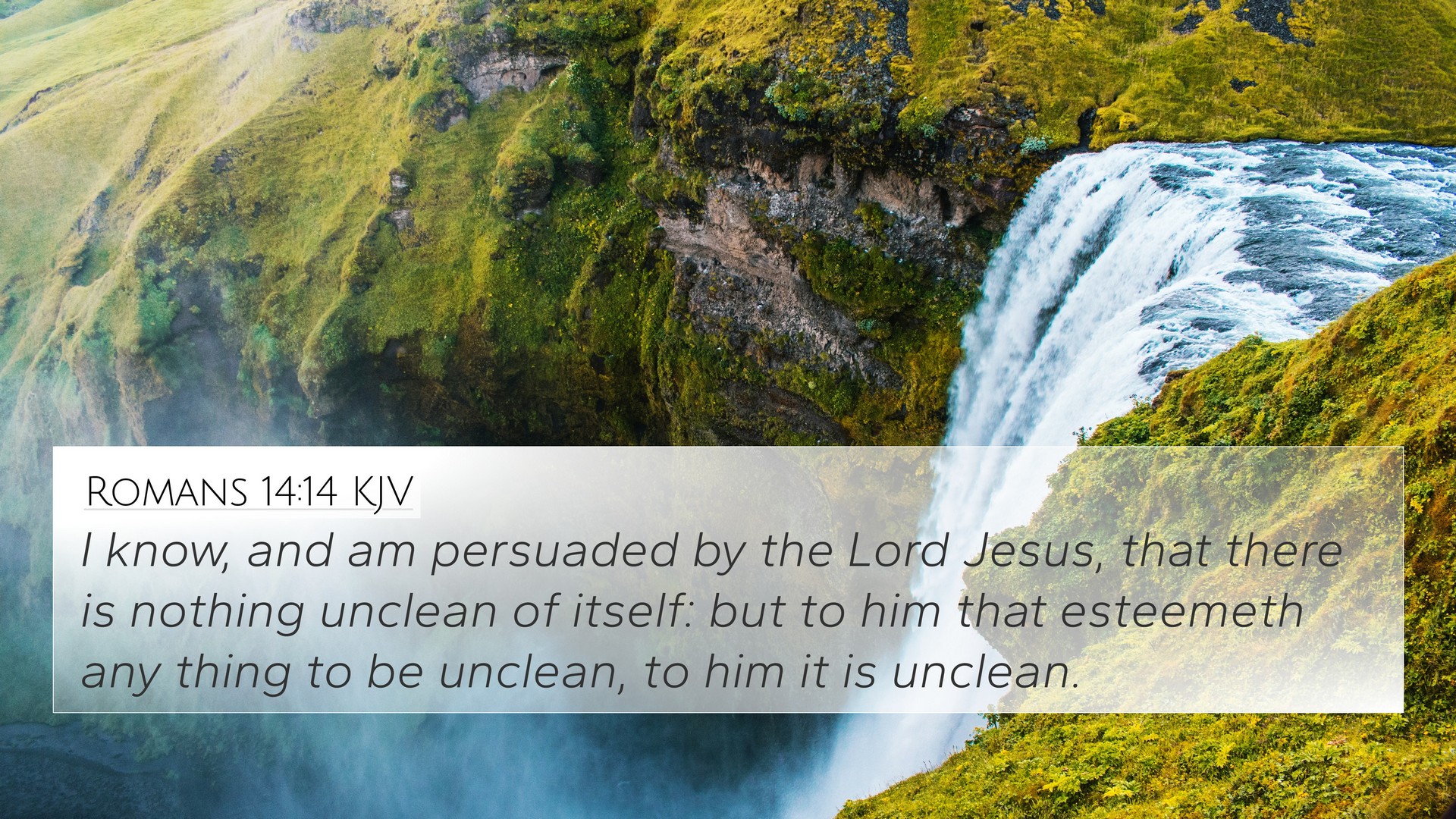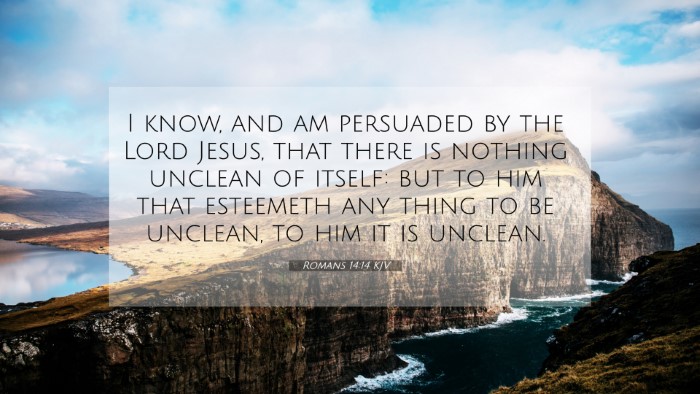Old Testament
Genesis Exodus Leviticus Numbers Deuteronomy Joshua Judges Ruth 1 Samuel 2 Samuel 1 Kings 2 Kings 1 Chronicles 2 Chronicles Ezra Nehemiah Esther Job Psalms Proverbs Ecclesiastes Song of Solomon Isaiah Jeremiah Lamentations Ezekiel Daniel Hosea Joel Amos Obadiah Jonah Micah Nahum Habakkuk Zephaniah Haggai Zechariah MalachiRomans 14:14 Similar Verses
Romans 14:14 Cross References
I know, and am persuaded by the Lord Jesus, that there is nothing unclean of itself: but to him that esteemeth any thing to be unclean, to him it is unclean.
Uncover the Rich Themes and Topics of This Bible Verse
Listed below are the Bible themes associated with Romans 14:14. We invite you to explore each theme to gain deeper insights into the Scriptures.
Romans 14:14 Cross Reference Verses
This section features a detailed cross-reference designed to enrich your understanding of the Scriptures. Below, you will find carefully selected verses that echo the themes and teachings related to Romans 14:14 KJV. Click on any image to explore detailed analyses of related Bible verses and uncover deeper theological insights.
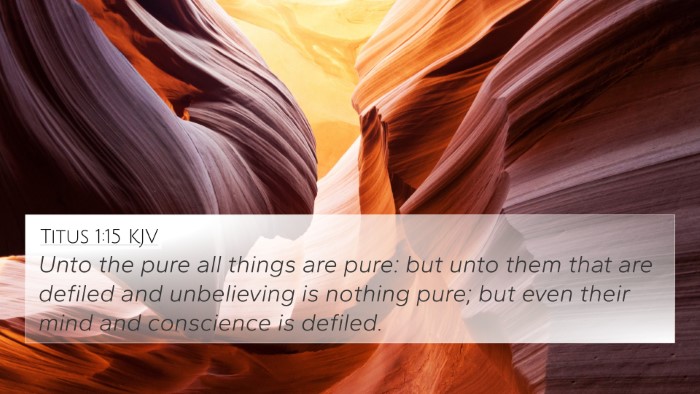
Titus 1:15 (KJV) »
Unto the pure all things are pure: but unto them that are defiled and unbelieving is nothing pure; but even their mind and conscience is defiled.
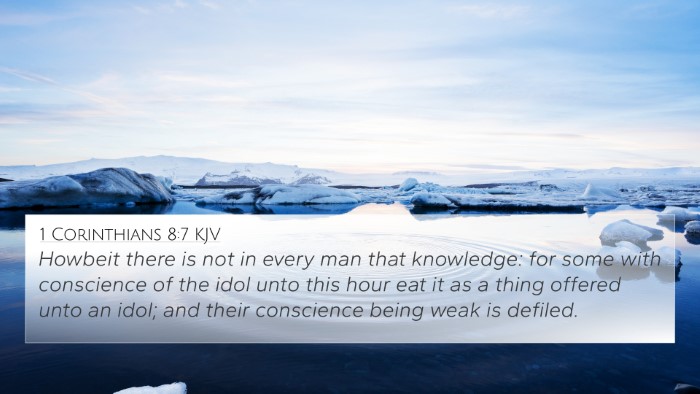
1 Corinthians 8:7 (KJV) »
Howbeit there is not in every man that knowledge: for some with conscience of the idol unto this hour eat it as a thing offered unto an idol; and their conscience being weak is defiled.
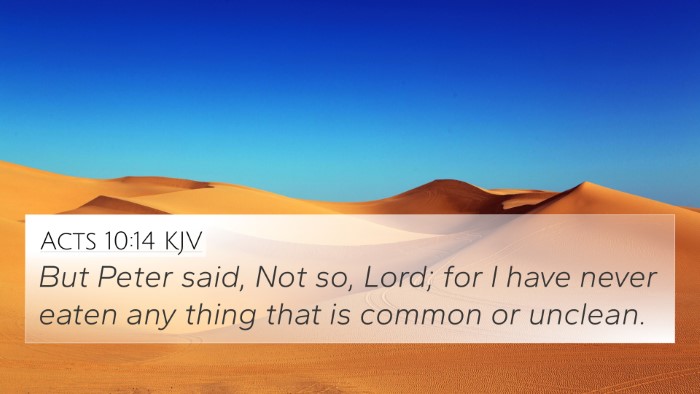
Acts 10:14 (KJV) »
But Peter said, Not so, Lord; for I have never eaten any thing that is common or unclean.
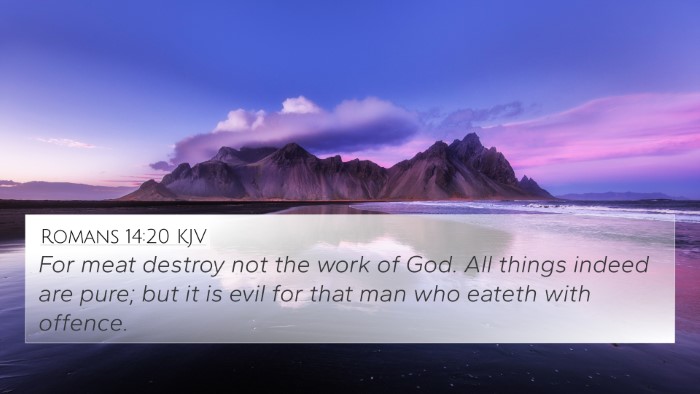
Romans 14:20 (KJV) »
For meat destroy not the work of God. All things indeed are pure; but it is evil for that man who eateth with offence.
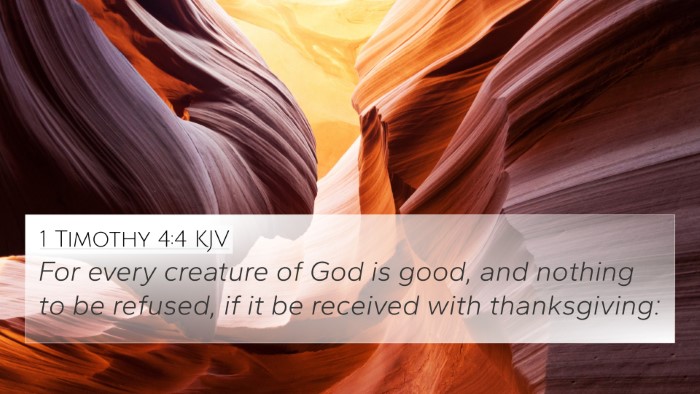
1 Timothy 4:4 (KJV) »
For every creature of God is good, and nothing to be refused, if it be received with thanksgiving:

Romans 14:2 (KJV) »
For one believeth that he may eat all things: another, who is weak, eateth herbs.
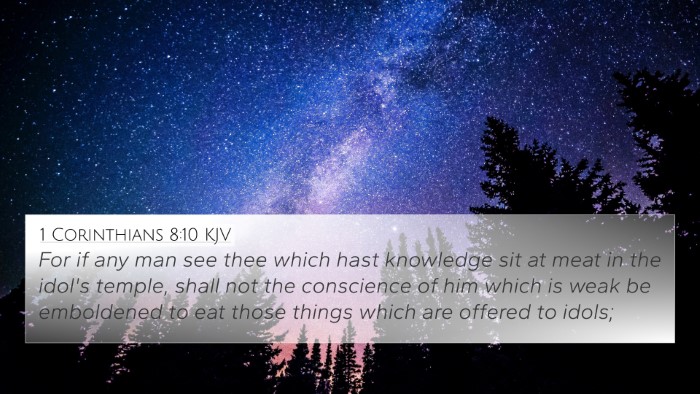
1 Corinthians 8:10 (KJV) »
For if any man see thee which hast knowledge sit at meat in the idol's temple, shall not the conscience of him which is weak be emboldened to eat those things which are offered to idols;

Romans 14:23 (KJV) »
And he that doubteth is damned if he eat, because he eateth not of faith: for whatsoever is not of faith is sin.
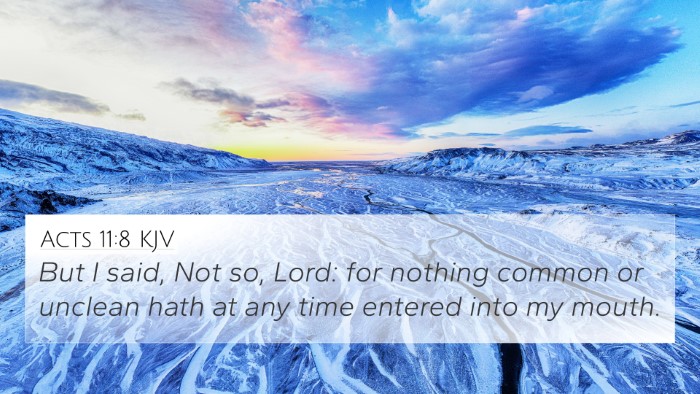
Acts 11:8 (KJV) »
But I said, Not so, Lord: for nothing common or unclean hath at any time entered into my mouth.
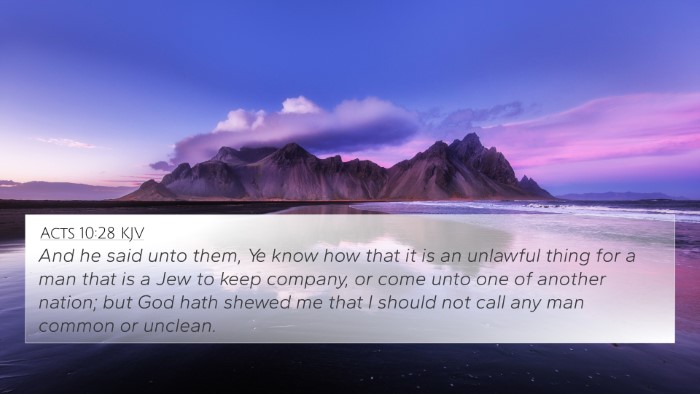
Acts 10:28 (KJV) »
And he said unto them, Ye know how that it is an unlawful thing for a man that is a Jew to keep company, or come unto one of another nation; but God hath shewed me that I should not call any man common or unclean.
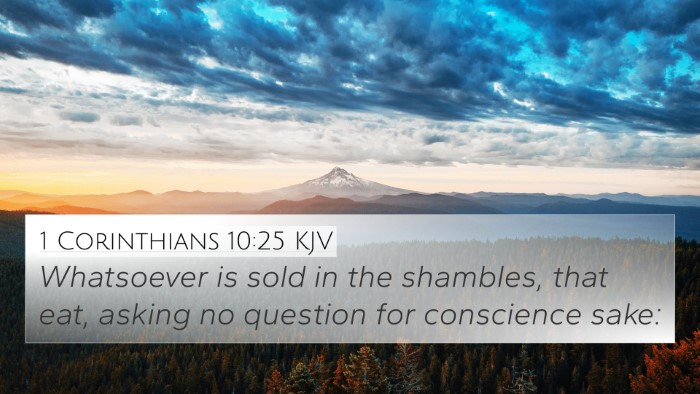
1 Corinthians 10:25 (KJV) »
Whatsoever is sold in the shambles, that eat, asking no question for conscience sake:
Romans 14:14 Verse Analysis and Similar Verses
Understanding Romans 14:14
Romans 14:14: "I know, and am persuaded by the Lord Jesus, that there is nothing unclean of itself: but to him that esteemeth any thing to be unclean, to him it is unclean."
Summary of Meaning
This verse emphasizes the concept of personal conviction in relation to clean and unclean things—an important theme in the New Testament. It addresses the idea that what may be seen as unclean or immoral is subjective and largely depends on individual conscience and faith.
Insights from Commentaries
- Matthew Henry:
Henry points out that the Apostle Paul acknowledges his own knowledge and assurance in Christ regarding the purity of all creations. The emphasis here is on the internal struggle of believers when it comes to their convictions about certain practices and customs.
- Albert Barnes:
Barnes clarifies that Paul's assertion stems from the realization that God created all things and intended for them to be enjoyed without the constraint of ceremonial law. However, he also stresses the importance of individual conviction which must be respected in a community of believers.
- Adam Clarke:
Clarke elaborates on the nature of the law that governs the believer's conscience. He notes that if one believes something to be unclean or sinful, it is indeed sinful for that person, highlighting the critical role of personal belief in morality.
Key Themes
- Personal Conviction: Each believer must be confident in their own understanding of what is clean or unclean.
- Freedom in Christ: Paul's assertion opens a broader understanding of Christian liberty that transcends traditional Jewish laws.
- Respect for Differences: Emphasizes the importance of accepting diverse convictions within the Christian community.
- Role of Conscience: The individual conscience plays a pivotal role in determining sinfulness.
Bible Verse Cross-References
- 1 Corinthians 8:8: Addresses food offered to idols and its impact on believers' conscience.
- Galatians 5:1: Encourages believers to stand firm in their freedom and avoid being burdened again by legalism.
- Colossians 2:16-17: Advises against judgment based on dietary laws.
- Matthew 15:11: Jesus teaches that what goes into the mouth doesn't defile, but what comes out does.
- Acts 10:15: God declares all things clean, emphasizing the change in New Testament understanding.
- Romans 14:5: Discusses believers' varying opinions on specific days being considered sacred.
- Titus 1:15: Points out that purity is defined by one's own perspective and conscience.
- James 4:17: Highlights that knowing the right thing to do and failing to do it is sin.
Connections Between Bible Verses
The connections among these verses underline the theme of freedom and personal conviction. Through 1 Corinthians 8:8 and Colossians 2:16-17, the New Testament authors further clarify that while believers may have freedom, they must also be careful not to cause fellow believers to stumble in their faith.
In contrast, verses like Matthew 15:11 and Acts 10:15 lift the restrictions traditionally held by the Jewish law, aligning believers more directly with their convictions under the teachings of Christ.
Thematic Bible Verse Connections
This verse also fosters a broader dialogue within the Scriptures concerning individual interpretation of the law versus the spirit of the law. It is a cornerstone for understanding Christian liberty, echoing themes found in Pauline epistles that support the notion that faith should guide actions rather than mere adherence to legalism.
Conclusion
Romans 14:14 serves as a vital teaching for believers, encouraging them to exercise their faith genuinely while being sensitive to how their actions affect others. The complexity of theological understanding stress the importance of cross-referencing biblical texts to hold a comprehensive view of scripture.
Using tools for Bible cross-referencing, believers can explore these connections deeply. The integration of personal beliefs and collective understanding becomes critical in forming a cohesive community that honors individual freedoms while abiding by the peace of Christ.
